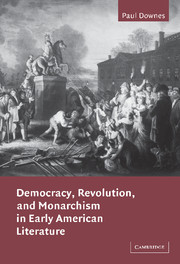Book contents
- Frontmatter
- Contents
- Preface
- Acknowledgments
- Introduction: the spell of democracy
- 1 Monarchophobia: reading the mock executions of 1776
- 2 Crèvecoeur's revolutionary loyalism
- 3 Citizen subjects: the memoirs of Stephen Burroughs and Benjamin Franklin
- 4 An epistemology of the ballot box: Brockden Brown's secrets
- 5 Luxury, effeminacy, corruption: Irving and the gender of democracy
- Afterword: the revolution's last word
- Notes
- Bibliography
- Index
5 - Luxury, effeminacy, corruption: Irving and the gender of democracy
Published online by Cambridge University Press: 22 September 2009
- Frontmatter
- Contents
- Preface
- Acknowledgments
- Introduction: the spell of democracy
- 1 Monarchophobia: reading the mock executions of 1776
- 2 Crèvecoeur's revolutionary loyalism
- 3 Citizen subjects: the memoirs of Stephen Burroughs and Benjamin Franklin
- 4 An epistemology of the ballot box: Brockden Brown's secrets
- 5 Luxury, effeminacy, corruption: Irving and the gender of democracy
- Afterword: the revolution's last word
- Notes
- Bibliography
- Index
Summary
In a democracy the people are, in certain respects, the monarch; in other respects, they are the subjects.
They can be the monarch only through their votes which are their wills. The sovereign's will is the sovereign himself. Therefore, the laws establishing the right to vote are fundamental in this government. Indeed, it is as important in this case to regulate how, by whom, for whom, and on what issues votes should be cast, as it is in monarchy to know the monarch and how he should govern.
(Baron de Montesquieu, The Spirit of the Laws, 10–11)There is no reality in any power that cannot be coined into votes.
(Petition from woman's rights advocates to the Wisconsin State Constitutional Convention, 1848)THE “CARNIVAL OF FRAUD”
Why did the American Revolution not extend the franchise to women? Because, explained John Adams in his famous reply to Abigail, “We [men] have only the name of masters, and rather than give up this, which would completely subject us to the despotism of the petticoat, I hope General Washington, and all our brave heroes would fight” (Book of Abigail and John, 123). Adams was less playful in his response to James Sullivan on May 26, 1776. Responding to Sullivan's proposal that “every person out of wardship” should have a say in the passing of legislation, Adams wrote: “Depend upon it, sir … it is dangerous to open so fruitful a source of controversy and altercation, as would be opened by attempting to alter the qualifications of voters.
- Type
- Chapter
- Information
- Publisher: Cambridge University PressPrint publication year: 2002

